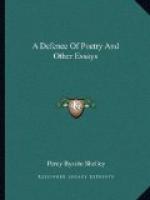It is difficult to define pleasure in its highest sense; the definition involving a number of apparent paradoxes. For, from an inexplicable defect of harmony in the constitution of human nature, the pain of the inferior is frequently connected with the pleasures of the superior portions of our being. Sorrow, terror, anguish, despair itself, are often the chosen expressions of an approximation to the highest good. Our sympathy in tragic fiction depends on this principle; tragedy delights by affording a shadow of the pleasure which exists in pain. This is the source also of the melancholy which is inseparable from the sweetest melody. The pleasure that is in sorrow is sweeter than the pleasure of pleasure itself. And hence the saying, ’It is better to go to the house of mourning, than to the house of mirth.’ Not that this highest species of pleasure is necessarily linked with pain. The delight of love and friendship, the ecstasy of the admiration of nature, the joy of the perception and still more of the creation of poetry, is often wholly unalloyed.
The production and assurance of pleasure in this highest sense is true utility. Those who produce and preserve this pleasure are poets or poetical philosophers.
The exertions of Locke, Hume, Gibbon, Voltaire, Rousseau, [Footnote: Although Rousseau has been thus classed, he was essentially a poet. The others, even Voltaire, were mere reasoners.] and their disciples, in favour of oppressed and deluded humanity, are entitled to the gratitude of mankind. Yet it is easy to calculate the degree of moral and intellectual improvement which the world would have exhibited, had they never lived. A little more nonsense would have been talked for a century or two; and perhaps a few more men, women, and children, burnt as heretics. We might not at this moment have been congratulating each other on the abolition of the Inquisition in Spain. But it exceeds all imagination to conceive what would have been the moral condition of the world if neither Dante, Petrarch, Boccaccio, Chaucer, Shakespeare, Calderon, Lord Bacon, nor Milton, had ever existed; if Raphael and Michael Angelo had never been born; if the Hebrew poetry had never been translated; if a revival of the study of Greek literature had never taken place; if no monuments of ancient sculpture had been handed down to us; and if the poetry of the religion of the ancient world had been extinguished together with its belief. The human mind could never, except by the intervention of these excitements, have been awakened to the invention of the grosser sciences, and that application of analytical reasoning to the aberrations of society, which it is now attempted to exalt over the direct expression of the inventive and creative faculty itself.




